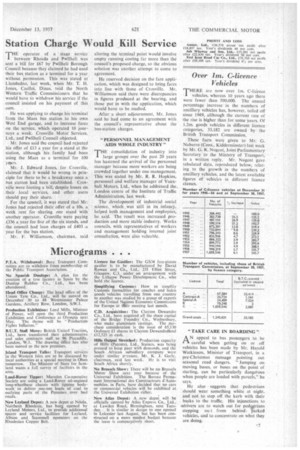Station Charge Would Kill Service T HE operator of a stage
Page 49

If you've noticed an error in this article please click here to report it so we can fix it.
service between Rhosdu and Pwllheli was sent a bill for £67 by Pwllheli Borough Council because they claimed he had used their bus station as a terminal for a year without permission. This was stated at Llandudno, last week, when Mr. T. H. Jones, Codicil, Dinas, told the North Western Traffic Commissioners that he would have to withdraw his service if the council insisted on his payment of this sum.
He was applying to change his terminal from the Maes bus station to his own West End garage, and to increase fares on the service, which operated 10 journeys a week. Crosvillc Motor Services, Ltd., and Pwllheli Council objected.
Mr. Jones said the council had rejected his offer of £13 a year for a stand at the station, although his family had been using the Maes as a terminal for 100
r3RTS.
Mr. J. Edward Jones, for Crosville, claimed that it would be wrong in principle for there to he a breakaway once a bus station had been establiShed. Crosville were footing a bill, despite losses on their local services, and other users should pay their share.
For the council, it was stated that Mr. Jones had rejected their offer of a 10s. a week rent for sharing one stand with another operator. Crosville were paying £336 a year for five of the six stands, and the council had loan charges of £403 .a year for the bus station.
Mr. F. Williamson, chairman, said altering the terminal point would involve empty running costing far more than the council's proposed charge, so the obvious solution was another attempt to come to agreement.
He reserved decision on the fare application, which was designed to bring fares into line with those of Crosville. Mr. Williamson said there were discrepancies in figures produced at the hearing, and those put in with the application, which would have to be studied.
After a short adjournment, Mr. Jones said he had come to an agreement with the council's representative about the bus-station charges.
"PERSONNEL MANAGEMENT AIDS WHOLE INDUSTRY"
THE consolidation of industry into large groups over the past 20 years has hastened the arrival of the personnel manager because more workers arc being crowded together under one management. This was stated by Mr. R. R. Hopkins, personnel and welfare manager of Vauxhall Motors, Ltd.. when he addressed the. London centre of the Institute of Traffic Administration, last week.
The development of industrial social science, which was still in its infancy, helped both management and employees, he said. The result was increased production and more stable. industry. Works councils, with representatives of workers and management holding internal joint consultation, were also valuable.




















































































































